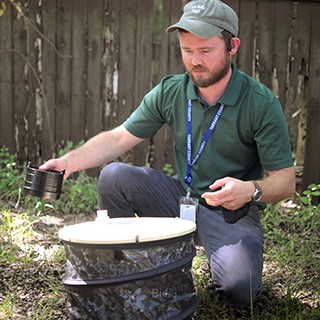Mosquito Surveillance
Tarrant County Public Health (TCPH)’s extensive mosquito-surveillance program allows staff to monitor areas for mosquito activity and detect mosquito-borne diseases.
Most municipalities in Tarrant County have agreed to work with Public Health regarding mosquito surveillance efforts and maintain mosquito traps within their city limits.
There are various types of mosquito traps deployed throughout the county to collect mosquitoes. The collection of mosquitoes caught in the trap at each site is called a pool. The pool is transported to our Vector Lab for arbovirus testing.
Female mosquitoes are separated by species into groups of 1-50 mosquitoes per surveillance site. Once they are grouped, it is called a sample. The sample is then tested for the presence of West Nile Virus (WNV) and St. Louis Encephalitis (SLE).
While the mosquito season is considered to be April through November (MMWR weeks 10-46), TCPH conducts testing throughout the entire year.
Testing results are found in weekly Arbovirus Reports.



Mosquito species that carry disease
Culex quinquefasciatus mosquitoes are the primary vector for West Nile Virus (WNV) and St. Louis Encephalitis (SLE) in Texas. However, data shows that other Culex mosquitoes have been implicated as vectors for other arboviruses.
Gravid traps are specifically designed to attract Culex mosquitoes due to their egg-laying preference, and thus are used to target Culex mosquitoes for collecting and testing. TCPH currently tests Culex quinquefasciatus, Culex restuans, Culex tarsalis and Culex nigripalpus for the presence of WNV and SLE.
Stegomyia mosquitoes, which include Aedes aegypti and Aedes albopictus species, are primary vectors for zika virus, chikungunya virus, yellow fever, and dengue virus. TCPH focuses on monitoring these specific species to reduce the abundance of disease-carrying mosquitoes and subsequently lower the risk of residents contracting an arbovirus (arthropod-borne virus).
Our Mosquito Dashboard Map below lists locations and details regarding mosqito traps throughout Tarrant County. It also lists test results by city and by timeline.


 TARRANT COUNTY, TX
TARRANT COUNTY, TX

 Environmental Health
Environmental Health